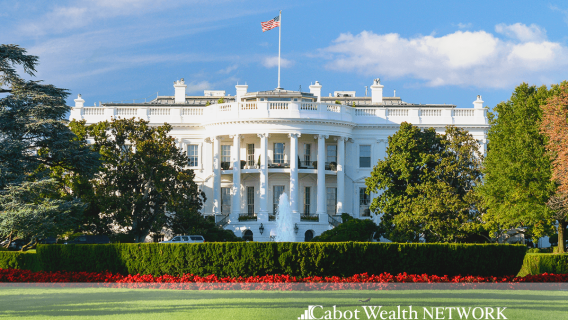On Monday, January 20, 2025, President Donald Trump kicked off his first day back in the White House by signing a series of executive orders in front of the cameras. Let’s talk about how those executive orders could impact the economy and the stock market.
What executive orders did Trump sign? Are they good, bad or neutral for the stock market? And are any executive orders especially good for small-cap stocks?
[text_ad]
Executive Order on Global Taxes
Trump’s executive order on the Global Tax Deal pulls the U.S. out of the 2021 OECD Global Tax Deal and aims to realign international tax policies to ensure American companies remain competitive globally.
This order should be good for large-cap U.S. companies as these are the larger, multinational companies with the greatest exposure to the OECD Global Tax Deal. While there is likely some benefit for smaller companies with international exposure, it’s pretty limited.
Executive Order on Department of Government Efficiency (DOGE)
Trump’s executive order on the Department of Government Efficiency (DOGE) is aimed at streamlining and enhancing the operations of federal agencies. It calls for a review of current processes, reducing bureaucratic inefficiencies, cutting costs, and improving overall governmental performance. DOGE will be the next generation of a White House tech team, known as the U.S. Digital Service, that was set up by former president Barack Obama. It will be led by Elon Musk.
If this order results in a more efficient and responsive government that better serves the American public, supports economic growth and helps get the federal deficit under control, it would be a huge win for the market. But so far nothing has happened, so best not to jump to conclusions.
That said, one of the details from the order calls for “… modernizing Federal technology and software to maximize governmental efficiency and productivity.” This is bullish for software companies with FedRAMP certification, which includes a lot of small and mid-cap and software companies.
Executive Order on AI Deregulation
Trump’s second presidency is expected to have an aggressive deregulatory agenda as Republicans seek to eliminate numerous federal regulations they think are a burden to businesses.
We got the first taste of this on Monday when Trump signed an executive order repealing Joe Biden’s order on AI safety. This order’s goal is to slash red tape and create a more business-friendly operating environment for the growing AI industry in the U.S.
I think this is generally good for the stock market since it illustrates the new administration’s desire to make progress on its deregulatory agenda.
Executive Order Withdrawing the U.S. from the Paris Climate Agreement
Trump’s executive order pulls the U.S. out of the Paris Climate Agreement for the second time (Biden rejoined the deal). It takes a year to pull out, so this isn’t immediately effective. Trump also went after federal procurement targets for clean power, EVs and other energy goals.
Withdrawing the U.S. from the Paris Climate Agreement and rolling back clean power and other Biden-era energy goals is a mixed bag. On the one hand, it shows the administration’s desire to prioritize American energy independence and economic growth over global climate pledges, which could be a positive for the stock market. But on the other hand, it removes clean energy incentives and muddies the waters for companies that have made major investments based on Biden-era policies. Net neutral, I think.
Executive Order on Trade
Trump’s executive order on trade didn’t include the harsh tariffs many expected, though it does aim to renegotiate existing trade agreements and impose tariffs on certain imported goods. The initial focus is on Canada and Mexico, two countries Trump said would face 25% tariffs on imports starting on February 1.
While this is clearly something of an evolving protectionist effort and therefore tough to predict potential impacts, the intent – boosting the U.S. manufacturing sector and prioritizing American jobs – should theoretically be good for the U.S. economy.
But it’s too early to make a call here as much depends on what the actual tariff picture is and how other countries respond. For now, Trump seems to be taking a more gradual and market-friendly approach to imposing tariffs than many had feared. This is good for the stocks across all market cap sizes.
The Bottom Line for the Stock Market & Small Caps
There are going to be a lot of moving parts as global markets adjust to Trump’s first round of executive orders (and subsequent rounds as well).
But the early read is that investors think Trump’s first round of executive orders are positive for the stock market.
Interestingly, small-cap stocks are rallying more than large caps. And small caps are getting a decent amount of positive press as a result.
Given that small caps have underperformed for a while and that small-cap earnings growth is expected to outpace large-cap earnings growth in 2025, it wouldn’t surprise me to see the S&P 600 SmallCap Index rally to fresh highs.
The easiest way to play the strength is with an ETF that tracks a small-cap index. I prefer the iShares S&P 600 ETF (IJR).
It’s also notable that cloud software stocks are rallying, possibly due to the executive order establishing DOGE. Consider looking at the Cloud Computing ETF (CLOU) or the WisdomTree Cloud Computing Fund (WCLD) ETFs for exposure.
Alternatively, consider grabbing a subscription to Cabot Small-Cap Confidential, where I cover stocks that can crush the performance of any ETF out there. You can grab a subscription here.
[author_ad]

